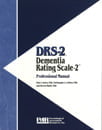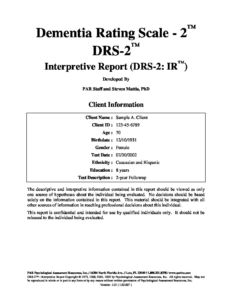
Dementia Rating Scales-2 drs-2
For: Measure cognitive status in adults with cognitive impairment in ages 55-89 years and older
Reading Level: Adult - Elder Adult
Format: Paper-and-Pencil
Length: 15-30 minutes
Scoring: Hand Scored
Online Forms, Reports, Kits & e-Manuals
All online resources including Forms, Reports, i-Admins, Kits and e-Manuals.
Printed Manuals
Physical printed manuals.
Printed Forms & Handscoring Materials
Test forms, response booklets and scoring reference manuals.
Printed Kits
Click to browse products
DRS-2 online Interpretive Report (each) min order 5
DRS-2 Professional Manual
DRS-2 Profile Forms (50)
DRS-2 Scoring Booklets (50)
DRS-2 Stimulus Cards (1 Set)
DRS-2 Introductory Kit
Sample Reports
Author
Steven Mattis, PhD
Professional Manual by Paul J. Jurica, PhD, Christopher L. Leitten, PhD, Steven Mattis, PhD
Description
Research conducted after the publication of the original Dementia Rating Scale (DRS) showed that both age and education contribute significantly to DRS subscale and Total Scores. This finding, along with several other factors, provided the impetus for the development of the DRS-2.
The DRS-2 measures cognitive function at lower ability levels where some other evaluation instruments are limited by floor effects. The DRS-2 also may be used to track changes in cognitive status over time. By design, the DRS-2 measures deficits in a large range of higher cortical functions and differentiates deficits of varying severity levels.
The DRS-2 incorporates the original 36 DRS tasks and 32 stimuli, yielding five subscale scores, and an assessment of the patient’s overall level of cognitive functioning. The five DRS-2 subscales provide additional information on specific abilities including Attention (8 items), Initiation/Perseveration (11 items), Construction (6 items), Conceptualisation (6 items), and Memory (5 items). Stimulus items consist of material familiar to most individuals.
The DRS-2 tasks are presented in a fixed order. Within each subscale the most difficult tasks are presented first. Generally, if the first one or two tasks in a subscale are performed well, subsequent tasks in the subscale are credited with a correct performance and the examiner proceeds to the next subscale. This procedure significantly shortens the total testing time for individuals with relatively intact cognitive functioning.
Features
A newly designed 12-page DRS-2 Scoring Booklet that facilitates administration and scoring.
A Profile Form that helps to create a graphical representation for interpretation.
An expanded age range (55-89 years and older).
Age-corrected normative tables for all DRS-2 subscales with age- and education-corrected normative data for the DRS-2 Total Score.
The 32 Stimulus Cards and the 36 tasks of the original DRS.
Expanded literature review with a discussion of DRS reliability and validity studies.
Validity studies comparing the DRS with WMSR and WAIS-RR subtests and the MMSE
NB: Prices are in Australian dollars inclusive of GST. NZ customers need to log in to view ex-GST prices.
 NZ
NZ





